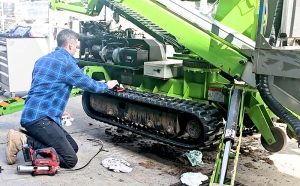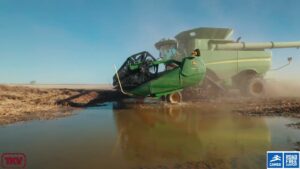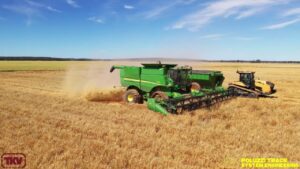WHO
The first of the 6 things you need to know when buying rubber tracks is – “who actually is the company I am looking at buying from??” No matter how good, bad or indifferent the quality of the product is – you need to make sure that you are working with a company that has a proven ability to supply and back-up their product over a period of time. In the days of the online sales, it is so easy to set up a pretty website, flog a dodgy product and disappear – leaving you in the lurch.
Some good questions to ask a prospective supplier include:
- How long have you been supplying rubber tracks?
b. Do you import your own product or buy from someone else locally?
c. Do you have your own warehouse that I can visit to look at the product?
WHAT
Now for the tricky part. All rubber tracks look like black lumps of rubber, and everyone tells you that theirs are the best!! How do you really know what you are getting?? We suggest you ask for the names and numbers of customers who have used the product in the past. Ask them some detailed questions about how the tracks are made, what are the components and why do they use the supplier they use?
This line of questioning can be interesting. You soon will have a good idea how much they know about their product (if anything) and how much they really care. A couple of red flags though, if you hear comments including “stainless steel cables” or ”100% natural rubber compound”or “made in America”or “good as Bridgestone”, then run for the hills!
WHY
Another important, but often over-looked consideration when buying rubber tracks is “why are you replacing your existing tracks?”. This can be a very illuminating question, for example, if you are not getting good life out of the tracks you have been using then perhaps:
- The brand of track is not good enough?
b. Perhaps your operators need some more training?
c. Have you perhaps considered that rubber tracks may not be the best option for your application?
d. Have you thought of steel tracks and rubber pads?
e. Maybe the machine you are using is not the best machine for the job?
WEIGHT
It has been said that buying rubber tracks is a bit like buying a steak. You tend to get what you pay for and you pay by the kilo. Most rubber track factories charge a price per kilo for rubber tracks. Due to the GFC and the reduction in sales, in order to get the price down, many factories have significantly reduced the weight of their tracks. This means less steel, less strength, less tread depth and altogether less track.
So make sure you are comparing apples for apples. Ask the exact weight in kilos of the track you are looking to buy. Not a guarantee of quality, but tends to be a very good gauge.
WARRANTY
This is a question I get asked all the time these days. Many rubber track suppliers are offering extended warranty terms in order to make their product appear more attractive. The brutal fact is – warranty only covers manufacturing defects. It does not cover wear and tear, damage, cuts, abrasions or such damage. You tell me – after 2 years of use, how are you going to be able to tell what is warranty and what is damage?? You can’t.
At the end of the day, extended warranties in my opinion are false advertising. In fact if you read the terms and conditions of some of these warranties, you would be horrified. We have seen clauses stipulating that tracks that have been driven in water are warranty voided! In my opinion, if you don’t intend to back your product, don’t try to say that you will just to get the sale.
HOW LONG
So how long will you really need your tracks to last? It is very easy to justify the cheapest option by saying that the machine will be traded in soon. Indeed if I had $100 for every excavator owner who came to me with a broken track on a machine that was to be traded in next week, I would be driving something a whole lot nicer than I am!
Remember, a good track is mostly only a few bucks more than a cheapy, but that few bucks can be a very cheap insurance against a few days lost work with the machine down waiting for new tracks. You will also most likely more than recover the extra when you do go for your trade-in figure, as the dealer will have to cost in a new set of tracks if the existing tracks are scruffy.
Good luck when buying rubber tracks – if you have any questions, or you would like some advice, feel free to flick me an email [email protected]
Ash Collins
TKV – 1300 65 11 43 or email us


